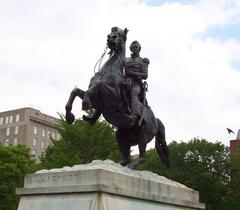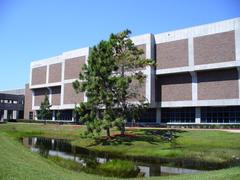
Fort Caroline Visiting Hours, Tickets, and Your Guide to Jacksonville’s Historical Treasure
Date: 03/07/2025
Introduction: Fort Caroline’s Legacy in Jacksonville
Fort Caroline National Memorial, situated along the scenic St. Johns River in Jacksonville, Florida, offers an immersive journey into the earliest chapters of European colonization in North America. Established by French Huguenots in 1564, Fort Caroline predates many better-known settlements, standing as a testament to the quest for religious refuge, colonial ambition, and the complex interactions between Europeans and Indigenous peoples like the Timucua. Today, the memorial provides not just a reconstructed fort and interpretive exhibits but also access to the surrounding Timucuan Ecological and Historic Preserve, blending cultural history with natural beauty. Visitors enjoy free admission, accessible facilities, ranger-led programs, and nature trails, making Fort Caroline a must-see destination for history buffs, families, and nature lovers alike. For up-to-date visiting hours and detailed planning resources, consult the National Park Service, Visit Jacksonville, and Legends of America.
Table of Contents
- Discover Fort Caroline: Historical Overview
- Fort Caroline’s Founding and Colonial Context
- Life at the Settlement and Indigenous Relations
- Spanish Conquest and Aftermath
- The Mystery of the Original Fort’s Location
- The Modern Memorial: Visiting Hours, Tickets, and Features
- Travel Tips and Nearby Attractions
- Accessibility and Amenities
- Frequently Asked Questions (FAQ)
- Visuals and Digital Resources
- Plan Your Visit: Practical Information
- Summary and Final Tips
- References
Discover Fort Caroline: Historical Overview
Fort Caroline’s Founding and Colonial Context
In 1562, French explorer Jean Ribault claimed land at the mouth of the St. Johns River for France. Two years later, René Goulaine de Laudonnière established Fort Caroline, providing a haven for Huguenots fleeing religious persecution (National Parks Data; NPS). This fortification marked the beginning of French ambitions in Florida, predating both Jamestown and St. Augustine, and set the stage for intense religious and imperial rivalries (Legends of America).
Life at the Settlement and Relations with Indigenous Peoples
The early settlers of Fort Caroline relied on alliances with the Timucua, particularly the Saturiwa chiefdom. The Timucua assisted with construction, shared vital resources, and engaged in trade. Despite hardships—disease, food shortages, and harsh conditions—these alliances were crucial for survival (The Jaxson; Modern Cities).
Spanish Conquest and Aftermath
Spain, viewing the French presence as a direct threat to its territorial claims, established St. Augustine in 1565. Spanish forces under Pedro Menéndez de Avilés soon attacked and captured Fort Caroline, killing most of the French defenders and reestablishing the site as Fort San Mateo. This event ended France’s colonial ambitions in Florida and cemented Spanish dominance in the region (Florida Backroads Travel; Wikipedia).
The Mystery of the Original Fort’s Location
Environmental changes, river shifts, and urban development have obscured the original site of Fort Caroline. Some research suggests the fort may have been further north, possibly on the Altamaha River in Georgia, though this remains debated (NPPlan; Legends of America). Despite the uncertainty, the replica in Jacksonville serves as the primary site for public education and commemoration (History Tools).
The Modern Memorial: Visiting Hours, Tickets, and Features
Hours and Admission
- Location: 12713 Fort Caroline Rd, Jacksonville, FL 32225
- Hours: Open daily, typically from 9:00 AM to 5:00 PM (check the official NPS website for current hours and seasonal changes)
- Admission: Free entry; no tickets or reservations required (Visit Jacksonville)
- Guided Tours: Ranger-led programs are available on weekends and holidays; schedules are posted online.
Key Features
- Visitor Center: Start your visit here for maps, exhibits, educational programs, and insights into both French and Timucua cultures. Interactive displays and knowledgeable rangers help bring the 16th-century story to life (Florida Visiting).
- Reconstructed Fort: Walk through the triangular palisade and bastions, complete with cannons and defensive works, reflecting the original fort’s scale and design.
- Timucuan Village Exhibit: Learn about indigenous life and the early cross-cultural exchanges.
- Nature Trails: The French Memorial Trail and other paths lead through maritime forests and along the river, offering interpretive signage and scenic overlooks (Explore the St. Johns).
- Ribault Monument: A tribute to explorer Jean Ribault, highlighting French contributions to Florida’s history.
Educational and Recreational Programs
- Ranger-Led Tours: Explore colonial survival, exploration, and cultural encounters.
- Junior Ranger Program: Engaging activities for children, culminating in a badge (Visit Jacksonville).
- Special Events: Living history demonstrations, reenactments, and educational workshops are scheduled throughout the year (Explore the St. Johns).
Travel Tips and Nearby Attractions
Tips for a Memorable Visit
- Weather: Spring and fall offer the most comfortable conditions. Bring water, sunscreen, and insect repellent for Florida’s climate.
- Photography: The replica fort, river overlooks, and nature trails provide excellent photo opportunities. Use descriptive alt tags like “Fort Caroline replica fort Jacksonville” and “St. Johns River overlook at Fort Caroline” for digital images.
- What to Bring: Comfortable shoes for trails, a camera, and snacks or a picnic (no food vendors on-site).
Accessibility and Amenities
- Accessibility: Paved paths, accessible restrooms, wheelchair-friendly parking, and audio tours ensure all visitors can enjoy the site (Florida Visiting).
- Facilities: Restrooms with changing stations, picnic shelters, water fountains, benches, and a gift shop (Explore the St. Johns).
- Pets: Leashed pets are welcome outdoors; service animals are allowed in buildings.
Nearby Attractions
- Timucuan Ecological & Historic Preserve: Over 46,000 acres of protected wetlands and historic sites, including nature trails and wildlife viewing (Park Ranger John).
- Kingsley Plantation: A well-preserved plantation site within the preserve.
- Ribault Club and Theodore Roosevelt Area: Additional historical and natural exploration opportunities.
Frequently Asked Questions (FAQ)
Q: What are Fort Caroline’s visiting hours?
A: Typically open daily from 9:00 AM to 5:00 PM; confirm on the NPS website for seasonal adjustments.
Q: Is there an admission fee?
A: No, admission is free and no tickets are required.
Q: Are guided tours available?
A: Yes, with schedules posted at the visitor center and online. Audio tours are also available.
Q: Is the site wheelchair accessible?
A: Yes, with paved paths, accessible restrooms, and designated parking.
Q: Are pets allowed?
A: Yes, leashed pets are permitted on trails and outdoor areas.
Q: Can I bring food?
A: Yes, picnic areas are available, but there are no food vendors on-site.
Visuals and Digital Resources
- Official NPS App: Download for offline maps, audio tours, and event notifications (NPS Fort Caroline).
- Virtual Tours and Interactive Maps: Available on the National Park Service website.
- Social Media: Follow Fort Caroline and Audiala for updates, photos, and travel tips.
Plan Your Visit: Practical Information
- Address: 12713 Fort Caroline Road, Jacksonville, FL 32225
- Phone: 904-641-7155
- Website: NPS Fort Caroline
- Parking: Free and ample for cars, buses, and RVs.
Sustainability and Park Etiquette
Please follow Leave No Trace principles: stay on marked trails, dispose of waste properly, and respect wildlife. Smoking and alcohol are prohibited on the grounds.
Summary
Fort Caroline National Memorial is a vital destination for those seeking a deeper understanding of early American history, offering a rich blend of historical interpretation and natural beauty. Its free access, extensive educational programming, and integration within the expansive Timucuan Preserve make it a top pick for visitors of all ages. Plan your visit by checking official hours, participating in ranger-led tours, and exploring digital resources like the Audiala app for enhanced experiences. Whether you’re a history enthusiast, family traveler, or nature lover, Fort Caroline stands as a cornerstone of Jacksonville’s cultural heritage (National Park Service - Fort Caroline; Florida Visiting; Explore the St. Johns).
References
- History Comes Alive at Fort Caroline National Memorial, National Parks Data
- Fort Caroline National Memorial History, National Park Service
- Fort Caroline: The French Settlement on the St. Johns, The Jaxson
- Fort Caroline, Wikipedia
- Fort Caroline National Memorial Park History, NPPlan
- Discovering Fort Caroline: A Tale of French Colonization in Florida, History Tools
- The Ultimate Visitor’s Guide to Fort Caroline National Memorial, National Parks Data
- Legends of America: Fort Caroline
- Fort Caroline: The French Settlement on the St. Johns, Modern Cities
- History Hit: Fort Caroline
- Florida Backroads Travel: History of Jacksonville
- Visit Jacksonville: Fort Caroline National Memorial
- Florida Visiting: Fort Caroline National Memorial
- Explore the St. Johns: Timucuan Ecological & Historic Preserve
- Park Ranger John: Timucuan Ecological and Historic Preserve
- NPS Fort Caroline Plan Your Visit
- Miss Tourist: Things to Do in Jacksonville Florida



























